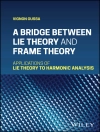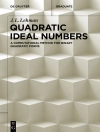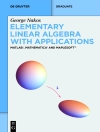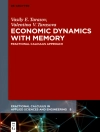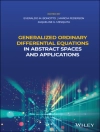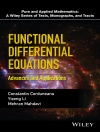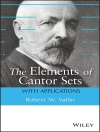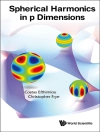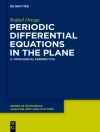This book collects original peer-reviewed contributions presented at the ‘International Conference on Mathematical Analysis and Applications (MAA 2020)’ organized by the Department of Mathematics, National Institute of Technology Jamshedpur, India, from 2–4 November 2020. This book presents peer-reviewed research and survey papers in mathematical analysis that cover a broad range of areas including approximation theory, operator theory, fixed-point theory, function spaces, complex analysis, geometric and univalent function theory, control theory, fractional calculus, special functions, operation research, theory of inequalities, equilibrium problem, Fourier and wavelet analysis, mathematical physics, graph theory, stochastic orders and numerical analysis. Some chapters of the book discuss the applications to real-life situations. This book will be of value to researchers and students associated with the field of pure and applied mathematics.
Table des matières
G. K. Srinivasan, A note on isolated removable singularities of harmonic functions.- O. Chadli, Ram N. Mohapatra, B. K. Sahu, Equilibrium Problems and Variational Inequalities: a Survey of Existence Results.- O. Chadli, Ram N. Mohapatra, G. Pany, Nonlinear evolution equations by a Ky Fan minimax inequality approach.- L. A. Wani and A. Swaminathan, Sufficient Conditions Concerning the Unified Class of Starlike and Convex Functions.- S. Menchavez and I. Mae Antabo, One Dimensional Parametrized Test Functions Space of Entire Functions.- D. Raghavan and S. Nagarajan, Extremal mild solutions of Hilfer fractional Impulsive systems.- B. Roy and S. N. Bora, On existence of integral solutions for a class of mixed Volterra-Fredholm integro fractional differential equations.- P. Kumar, A. Kumar, R. Kumar Vats and A. Kumar, Trajectory Controllability of Integro-differential Systems of Fractional Order γ ∈ (1, 2] in a Banach Space with Deviated Argument.- A. S. Kelil and A. Rao Appadu, Shehu-Adomian Decomposition Method for dispersive Kd V-type Equations.- A. S. Kelil, A. R. Appadu and S. Arjika, On certain properties of perturbed Freud-type weight: a revisit.- A. K. Singh, Complex chaotic systems and its complexity.- M. Incesu, S. Y. Evren and O. Gursoy, On the bertrand pairs of open non uniform B-spline curves.- M. Verma, P. Sharma and N. Gupta, Convergence analysis of a sixth-order method under weak continuity condition with First-order Frechet derivative.- B. Kour and S. Ram, (m, n)-paranormal composition operators.- T. Yaying, On the domain of q-Euler matrix in c0 and c.- N. Sarkar and M. Sen, Study on some particular class of non linear integral equation with a hybridized approach.- D. Saha, M. Sen and S. Roy, Investigation of the existence criteria for the solution of the functional integral equation in the Lp space.- S. Das and K. Mehrez, Functional Inequalities for the Generalized Wright Functions.- S. Dutta and P. Guha, An Information Theoretic Entropy Related to Ihara $/zeta$ Function and Billiard Dynamics.- S. Baskaran, G. Saravanan and K. Muthunagai, On a new subclass of Sakaguchi type functions using (p;q)- derivative operator.- N. K. Jangid, S. Joshi and S. D. Purohit, Some Double integral Formulae Associated with Q Function and Galue Type Struve Function.- M. Jain, M. Singh and R. K. Meena, Time-dependent analytical and computational study of an M/M/1 queue with disaster failure and multiple working vacations.- M. Datta and N. Gupta, Usual stochastic ordering results for series and parallel systems with components having Exponentiated Chen distribution.
A propos de l’auteur
OUAYL CHADLI is Professor of Mathematics for Economic Decisions at the Faculty of Economy, Ibn Zohr University, Agadir, Morocco. He received his Ph.D. in Applied Mathematics in 2000 from Cadi Ayyad University, Marrakesh, Morocco. Subsequently, he did his post-doctoral studies at the Department of Economics at the Universidad Autonoma de Barcelona, Spain (two years) and the Department of Applied Mathematics, National Sun Yat-Sen University, Kaohsiung, Taiwan (one year). His main research interests are in nonlinear analysis and optimizations on variational and hemivariational inequalities, equilibrium problems, nonlinear evolution equations, maximal monotone operators, game theory, economics, inverse problems, and optimal control. He also works on the numerical approaches for finding solutions for equilibrium problems and bilevel equilibrium problems with applications in game theory and transportations. He has published over 46 papers in prestigious journals and is presently Associate Editor of the
Journal of Nonlinear and Variational Analysis. In 2017, he visited the Department of Mathematics at the University of Central Florida, USA, under the Fulbright Visiting Scholar Program. He received the International Federation of Operational Research Societies (IFORS) award for his research achievements as a graduate student during the summer school on Generalized Convexity/Monotonicity, Samos, Greece, 1999.
SOURAV DAS is Assistant Professor at the Department of Mathematics, National Institute of Technology Jamshedpur, India. He completed his Ph.D. in Mathematics from the Indian Institute of Technology Roorkee, India, in 2017. Earlier, Dr. Das worked as Lecturer at the Department of Mathematics, National Institute of Technology Hamirpur, India. He has published several research articles in internationally reputed journals and conferences. His areas of research include complex analysis, orthogonal polynomials and special functions. He is actively involved in teaching undergraduate and postgraduate students as well as Ph.D. students. He visited several universities globally for academic activities and delivered many lectures and is also member of many professional societies such as American Mathematical Society (AMS), Society for Special Functions and their Applications (SSFA), and International Association of Engineers (IAENG).
RAM N. MOHAPATRA is Professor of Mathematics at the University of Central Florida,
Orlando, USA. He completed his Ph.D. in Mathematics in 1968 from Jabalpur University, India, under the guidance of late Prof. Tribikram Pati. He worked as a lecturer at the Regional College of Education, Bhubaneswar, India, and at the Postgraduate Department of Mathematics, Sambalpur University, India, before joining the American University of Beirut, Lebanon. He has published over 170 research papers in peer reviewed journals in summability theory and sequence spaces, Fourier analysis, approximation and geometric function theory, fluid mathematics, mathematical physics, mathematical models in epidemiology, frames in hilbert C* modules, optimal frames for erasers, variational inequalities, equilibrium problems, and optimization theory. He has coauthored a book and edited nine volumes published by renowned publishers (including Springer Nature). His current interests are in image encryption, cyber security, and equilibrium problems arising in variational inequality formulations. He is member of the American Mathematical Society.
A. SWAMINATHAN is Professor at the Department of Mathematics, Indian Institute of Technology Roorkee, India. He received his Ph.D. in Mathematics from the University of Madras, India, in the field of univalent functions, which is a branch of complex analysis. He continued to pursue his research work on various aspects of univalent functions and the computational aspects of various special functions, particularlyon the Gaussian hypergeometric functions and gamma functions. His research interest extends to the study of zeros and spectral properties of classical orthogonal polynomials defined on the real line and on the unit circle. He also has investigated the numerical quadrature formulas related to many of these polynomials. His research articles are published in reputed journals in mathematics. He has visited several institutions across the globe for research collaborations and participated in various mathematical meetings. He is member of many professional societies including the Society for Industrial and Applied Mathematics (SIAM), American Mathematical Society (AMS), the Society for Special Functions and their Applications (SSFA).



